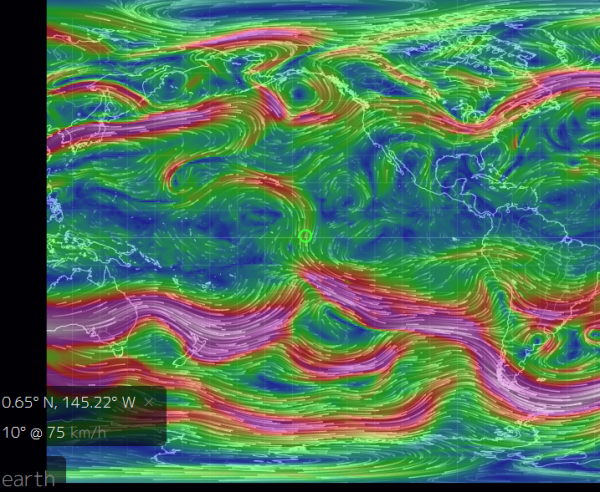'Death of winter': Jet streams cross equator, 'chaos' predicted
The streams now connect from pole to pole according to the data. © RT
Scientists have observed an “unprecedented” event that could lead to an end of seasons as we know them, after Northern Hemisphere jet streams crossed the equator and linked with others in the south.
Usually separated entirely from each other by the equator where warm air acts as a barrier, both the Northern and Southern Hemisphere consist of jet streams made up of either warm moist air or cold dry air.
The streams usually run from east to west but new data shows that the Northern Hemisphere’s streams have changed path and linked with streams in the south.
“Welcome to climate chaos. We must declare a global climate emergency” warned Paul Beckwith, a climate scientist from the University of Ottawa, when analyzing data from Earth Nullschool.
Beckwith explained the data in a video online in which he warned it could disrupt the world’s food supply and lead to “massive geopolitical unrest.”
Beckwith was alerted to the data by a blog post from environmentalist Robert Scribbler, who said the warming of polar air due to “human-forced climate change” was flattening the atmospheric slope from equator to pole, allowing the streams to deviate.
“It’s the very picture of weather weirding due to climate change,” said Scribbler. “Something that would absolutely not happen in a normal world, something, that if it continues, (on a significant scale) basically threatens seasonal integrity.”
For some reason RT chose to leave that phrase 'on a significant scale', out of that sentence, but it is in Scribbler's original blog: "Something, that if it continues on a significant scale, basically threatens seasonal integrity."
Scribbler's use of the word 'continues' makes it obvious that he thinks this is 'a significant scale' event. Have a look below.
A “death of winter” scenario could occur according to Scribbler, where summer heat occurs in winter and vice versa.
Not all scientists have agreed with this summation though, with Meteorologist Marshall Shepherd warning that the new data would require proper vetting before he could give an informed opinion.

Scribbler: The big trough today begins near the Northern Hemisphere Pole. It pulls Arctic air down over Eastern Siberia and into a Pacific Ocean storm track. There, a second big dip in the Jet Stream pulls a crazy loop of this upper air flow further south. And here is where things get really weird — for the upper level river of air that began in the Arctic then makes a jump directly across the Equator.
Let's look a little closer: There is a small jet (pink) over Siberia in the top-right corner. It splits into a stream that eventually circles the globe in the Arctic, and a weak stream that connects into another stream which flow eastward then southeast to join yet another stream, a strong stream from over Korea and Japan.
That stream heads east-northeast toward the Aleutians where it weakens and splits, part of it joining a stream that crosses North America along the Canada-US border, the other part, probably the main part, loops around toward the southwest. Some of that stream seems to continue westward while a small portion of it loops back around heading toward Hawaii.
Some of the Hawaii stream breaks off northeastward, but the main stream loops around toward the southeast and then south across the equator as it weakens.
That it is a significant event is not doubtable since it has rarely, if ever, been seen before. But to call it a 'significant level' event is a big stretch. Furthermore, the connection between Siberia and the equator is very weak and tenuous at best and certainly does not warrant the hysterical cry of the 'death of winter'.
We have just finished the strongest el nino ever recorded and it will be a few months before jet streams get back to normal patterns. Once they do, we may never see this phenomena again, although I suspect we will in another record el nino as the planet continues to warm.
But as I have stated many times, I believe that little if any of that warming is anthropogenic in origen.

No comments:
Post a Comment